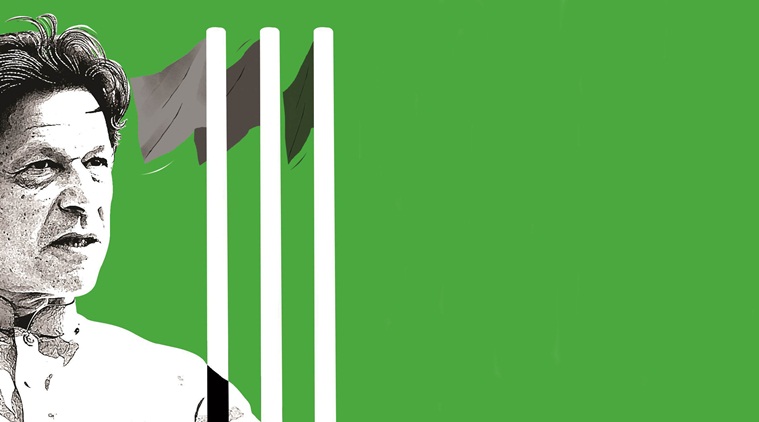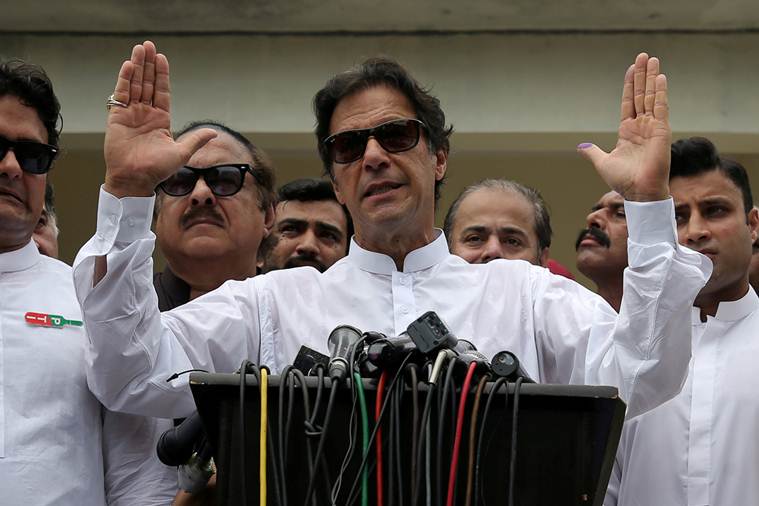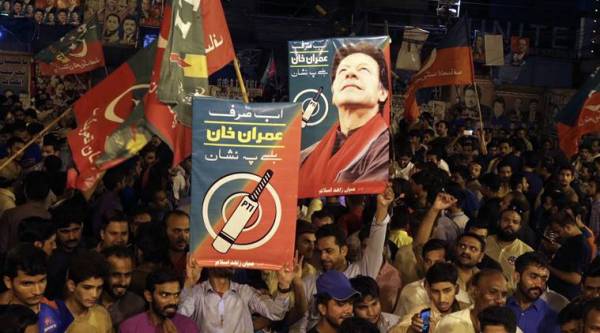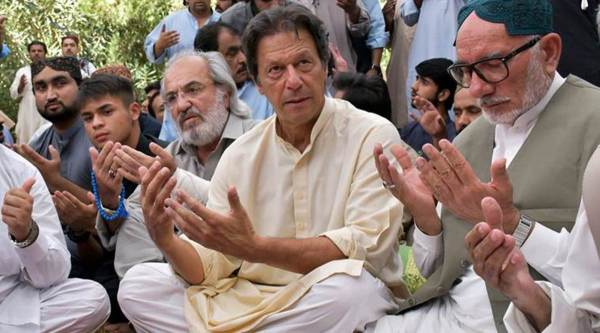Decoding the next Pakistan Prime Minister
Imran was a staunch opponent of Pakistan military operations against the Pakistani Taliban. His praise for the Taliban earned him the nickname of “Taliban Khan”.

Imran’s politics is a mix of middle-class aspiration for a “clean, transparent and accountable government”, Islamic egalitarianism, justice for all, liberal economics, and religious and social conservatism. (Illustration: C R Sasikumar)
Poised to take over as the Prime Minister of Pakistan, Imran Khan had to wait 22 years, most of them on the margins of his country’s political arena, to reach the highest office. From losing both seats in his first election in 1997 despite his cricketer-hero status, to the Pakistan-Tehreek-e-Insaf emerging the single largest party in 2018, Imran has a come a long way, with his politics too undergoing several makeovers over these two decades. His critics say he is confused, his supporters that it only shows he is open-minded.
But despite all the contradictions, from the beginning, one impression about the 65-year-old Imran has stayed: that he is a progeny of Pakistan’s powerful establishment, created to cut the two big players, Benazir Bhutto and her Pakistan People’s Party, and Nawaz Sharif and his Pakistan Muslim League (N).
This election, probably Pakistan’s most polarising in recent history, has entrenched that reputation — the military’s open animosity towards Sharif, and some of its moves in the last five years signalled its preference for Imran.
Mixed politics, mixed following
Imran’s politics is a mix of middle-class aspiration for a “clean, transparent and accountable government”, Islamic egalitarianism, justice for all, liberal economics, and religious and social conservatism. He supports the blasphemy law, is against repealing Pakistan’s Second Amendment that declares Ahmadiyya to be non-Muslim; he flirts with the Taliban, and in this election, canvassed support from the extremist Tehreek e-Labbaik Pakistan, and the virulently anti-Shia offshoot of the Sipah-e-Sahaba, Ahle Wal Suunah Jamat.
With his politics offering something for everyone, his following is a mix of the cosmopolitan middle-class in urban Pakistan, who fear the progress of religious conservatism in their lives, and the religious conservatives who believe Pakistan is getting too westernised.
Pakistan’s population of about 200 million is overwhelmingly young and aspirational. There were 46 million voters between the ages of 18 and 35. Almost 17 million of them came of age after the end of Pervez Musharraf’s tenure and have no experience of military rule. They have known only civilian governments of the PPP and PML(N), both perceived as corrupt. In this time, the Army recovered fully from the erosion of public faith in it that had set in midway during Musharraf’s rule, and presented itself as the only institution Pakistanis could count on.
Express Opinion | PML-N’s clash with Pak establishment, a media revolution, played a role in Khan’s victory
Accountability, thus, has been Imran’s main theme. In addition, the PTI’s promise of naya Pakistan is achche din plus AAP jhadoo: it includes a Medina-like welfare state in which education and health will get maximum priority, 10 million jobs, five million low-cost homes, and the return of black money that wealthy Pakistanis have stashed abroad.
Some of the promises, such as healthcare and education reform, are based on the PTI’s five-year experience of governance in Khyber-Pakhtunkhwa. Its healthcare initiatives in that province have won non-partisan praise. Affordable health has been Imran’s passion since he set up the Shaukat Khanum Memorial Cancer Research Hospital, named after his mother.
Expectations of him are high but a fair amount of political uncertainty may make it difficult for him to keep these promises.
India & neighbourhood
Foreign policy and national security are areas in which Pakistani Prime Ministers have found themselves bogged down, not least because of the military’s claim over them. But Imran has given enough indication that he is on the same page as the Army on foreign policy, including for the neighbourhood.
While he has declared himself a votary of peace with neighbours, he says he will not bow to India’s “thaanedaari”. He believes only the Pakistan Army can stand up to India. He called Sharif a coward for not responding militarily to the 2016 “surgical strikes”. He has said Prime Minister Narendra Modi “killed Muslims”in Gujarat. His real test with India will come with how he deals with the groups the Pakistan establishment protects: Lashkar-e-Taiba/Jamat-ud-Dawa and Jaish-e-Mohammed, responsible for a proxy war in Kashmir and terrorist acts in other parts of India.
Express Explained | The Pollitics of the Pakistan Army
As for the Taliban, he opposed US presence in Afghanistan, and was vocal against US-Pakistan military operations in the region after 9/11. That was around the time that he parted ways with Musharraf after praising his military coup at the beginning. This year, he described US President Donald Trump as “ignorant and ungrateful” for accusing Pakistan of giving “nothing but lies and deceit”in return for financial aid.
Imran was a staunch opponent of Pakistan military operations against the Pakistani Taliban. His praise for the Taliban earned him the nickname of “Taliban Khan”. That underwent a change after the Taliban attack on a school in Peshawar, in which over 100 children were killed; he backed the Army’s anti-Taliban operations.
His criticism of the China Pakistan Economic Corridor, questioning the lack of transparency, rang alarm bells in Beijing and Rawalpindi. He clarified he was not opposed to the projects, but only to the way they were being handled by the Sharif government. He reiterated his support for CPEC in a meeting with the Chinese Ambassador in Pakistan, but asked that it should also pass through Khyber-Pakthunkhwa, not just Punjab.
Marriage & controversy
Imran’s followers clearly decided to overlook his controversial personal life. Reham Khan, his second ex-wife’s tell-all book named after her, with graphic details about their brief marriage, alleging that he was hooked on cocaine, sex and anti-Islamic beliefs such as black magic and voodoo, plus that he had boasted of having children out of marriage in India, created barely a ripple among his followers. His recent third marriage to Bushra Maneka briefly outraged his followers. She was already married and is the mother of five children. Also known as Pinki — Imran was spotted in a pink T-shirt recently — she is rarely seen in public, and in photographs appears in the all-covering burqa. He has said she is his spiritual guide.
But the one who appears to retain significant influence on him is his ex-wife and British socialite Jemima Goldsmith, mother of his two sons. Supportive of some of his campaigns, Jemima is also his conscience-keeper of sorts. She would hardly agree with his statement that feminism was a “western import” that degraded motherhood. On Thursday, she tweeted, tagging him: “The challenge now is to remember why he entered politics in the 1st place.”
For all the latest Explained News, download Indian Express App
 Imran Khan, chairman of the Pakistan Tehreek-e-Insaf (PTI), speaks to the media after casting his vote at a polling station on July 25, 2018. (Reuters/Athit Perawongmetha)
Imran Khan, chairman of the Pakistan Tehreek-e-Insaf (PTI), speaks to the media after casting his vote at a polling station on July 25, 2018. (Reuters/Athit Perawongmetha) Supporters of Imran Khan celebrate projected results in the parliamentary elections in Islamabad, Pakistan, Wednesday, July 25, 2018. (AP Photo/K.M. Chaudary)
Supporters of Imran Khan celebrate projected results in the parliamentary elections in Islamabad, Pakistan, Wednesday, July 25, 2018. (AP Photo/K.M. Chaudary) Imran Khan holds his palms to pray and expresses condolence to the relatives of victims who were killed in Friday’s suicide attack during an election campaign meeting, in Quetta, Pakistan July 15, 2018. (Reuters/Naseer Ahmed)
Imran Khan holds his palms to pray and expresses condolence to the relatives of victims who were killed in Friday’s suicide attack during an election campaign meeting, in Quetta, Pakistan July 15, 2018. (Reuters/Naseer Ahmed)





































No hay comentarios:
Publicar un comentario